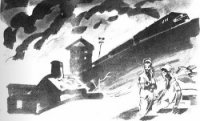Go Set a Watchman - Lee Harper (книги без регистрации полные версии TXT) 📗
The countryside and the train had subsided to a gentle roll, and she could see nothing but pastureland and black cows from window to horizon. She wondered why she had never thought her country beautiful.
The station at Montgomery nestled in an elbow of the Alabama, and when she got off the train to stretch her legs, the returning familiar with its drabness, lights, and curious odors rose to meet her. There is something missing, she thought. Hotboxes, that’s it. A man goes along under the train with a crowbar. There is a clank and then s-sss-sss, white smoke comes up and you think you’re inside a chafing dish. These things run on oil now.
For no reason an ancient fear gnawed her. She had not been in this station for twenty years, but when she was a child and went to the capital with Atticus, she was terrified lest the swaying train plunge down the riverbank and drown them all. But when she boarded again for home, she forgot.
The train clacketed through pine forests and honked derisively at a gaily painted bell-funneled museum piece sidetracked in a clearing. It bore the sign of a lumber concern, and the Crescent Limited could have swallowed it whole with room to spare. Greenville, Evergreen, Maycomb Junction.
She had told the conductor not to forget to let her off, and because the conductor was an elderly man, she anticipated his joke: he would rush at Maycomb Junction like a bat out of hell and stop the train a quarter of a mile past the little station, then when he bade her goodbye he would say he was sorry, he almost forgot. Trains changed; conductors never did. Being funny at flag stops with young ladies was a mark of the profession, and Atticus, who could predict the actions of every conductor from New Orleans to Cincinnati, would be waiting accordingly not six steps away from her point of debarkation.
Home was Maycomb County, a gerrymander some seventy miles long and spreading thirty miles at its widest point, a wilderness dotted with tiny settlements the largest of which was Maycomb, the county seat. Until comparatively recently in its history, Maycomb County was so cut off from the rest of the nation that some of its citizens, unaware of the South’s political predilections over the past ninety years, still voted Republican. No trains went there—Maycomb Junction, a courtesy title, was located in Abbott County, twenty miles away. Bus service was erratic and seemed to go nowhere, but the Federal Government had forced a highway or two through the swamps, thus giving the citizens an opportunity for free egress. But few people took advantage of the roads, and why should they? If you did not want much, there was plenty.
The county and the town were named for a Colonel Mason Maycomb, a man whose misplaced self-confidence and overweening willfulness brought confusion and confoundment to all who rode with him in the Creek Indian Wars. The territory in which he operated was vaguely hilly in the north and flat in the south, on the fringes of the coastal plain. Colonel Maycomb, convinced that Indians hated to fight on flat land, scoured the northern reaches of the territory looking for them. When his general discovered that Maycomb was meandering in the hills while the Creeks were lurking in every pine thicket in the south, he dispatched a friendly Indian runner to Maycomb with the message, Move south, damn you. Maycomb was convinced this was a Creek plot to trap him (was there not a blue-eyed, red-headed devil leading them?), he made the friendly Indian runner his prisoner, and he moved farther north until his forces became hopelessly lost in the forest primeval, where they sat out the wars in considerable bewilderment.
After enough years had passed to convince Colonel Maycomb that the message might have been genuine after all, he began a purposeful march to the south, and on the way his troops encountered settlers moving inland, who told them the Indian Wars were about over. The troops and the settlers were friendly enough to become Jean Louise Finch’s ancestors, and Colonel Maycomb pressed on to what is now Mobile to make sure his exploits were given due credit. Recorded history’s version does not coincide with the truth, but these are the facts, because they were passed down by word of mouth through the years, and every Maycombian knows them.
“… get your bags, Miss,” the porter said. Jean Louise followed him from the lounge car to her compartment. She took two dollars from her billfold: one for routine, one for releasing her last night. The train, of course, rushed like a bat out of hell past the station and came to a stop 440 yards beyond it. The conductor appeared, grinning, and said he was sorry, he almost forgot. Jean Louise grinned back and waited impatiently for the porter to put the yellow step in place. He handed her down and she gave him the two bills.
Her father was not waiting for her.
She looked up the track toward the station and saw a tall man standing on the tiny platform. He jumped down and ran to meet her.
He grabbed her in a bear hug, put her from him, kissed her hard on the mouth, then kissed her gently. “Not here, Hank,” she murmured, much pleased.
“Hush, girl,” he said, holding her face in place. “I’ll kiss you on the courthouse steps if I want to.”
The possessor of the right to kiss her on the courthouse steps was Henry Clinton, her lifelong friend, her brother’s comrade, and if he kept on kissing her like that, her husband. Love whom you will but marry your own kind was a dictum amounting to instinct within her. Henry Clinton was Jean Louise’s own kind, and now she did not consider the dictum particularly harsh.
They walked arm-in-arm down the track to collect her suitcase. “How’s Atticus?” she said.
“His hands and shoulders are giving him fits today.”
“He can’t drive when they’re like that, can he?”
Henry closed the fingers of his right hand halfway and said, “He can’t close them any more than this. Miss Alexandra has to tie his shoes and button his shirts when they’re like that. He can’t even hold a razor.”
Jean Louise shook her head. She was too old to rail against the inequity of it, but too young to accept her father’s crippling disease without putting up some kind of fight. “Isn’t there anything they can do?”
“You know there isn’t,” Henry said. “He takes seventy grains of aspirin a day and that’s all.”
Henry picked up her heavy suitcase, and they walked back toward the car. She wondered how she would behave when her time came to hurt day in and day out. Hardly like Atticus: if you asked him how he was feeling he would tell you, but he never complained; his disposition remained the same, so in order to find out how he was feeling, you had to ask him.
The only way Henry found out about it was by accident. One day when they were in the records vault at the courthouse running a land title, Atticus hauled out a heavy mortgage book, turned stark white, and dropped it. “What’s the matter?” Henry had said. “Rheumatoid arthritis. Can you pick it up for me?” said Atticus. Henry asked him how long he’d had it; Atticus said six months. Did Jean Louise know it? No. Then he’d better tell her. “If you tell her she’ll be down here trying to nurse me. The only remedy for this is not to let it beat you.” The subject was closed.
“Want to drive?” said Henry.
“Don’t be silly,” she said. Although she was a respectable driver, she hated to operate anything mechanical more complicated than a safety pin: folding lawn chairs were a source of profound irritation to her; she had never learned to ride a bicycle or use a typewriter; she fished with a pole. Her favorite game was golf because its essential principles consisted of a stick, a small ball, and a state of mind.
With green envy, she watched Henry’s effortless mastery of the automobile. Cars are his servants, she thought. “Power steering? Automatic transmission?” she said.




